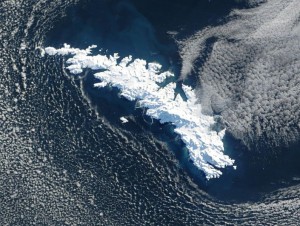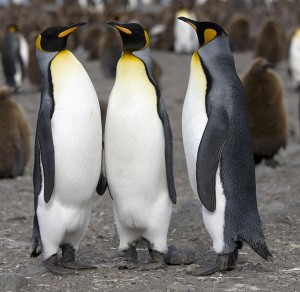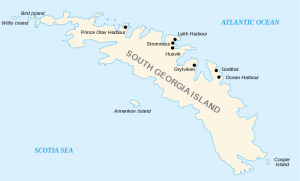 I live in a big village in east Northants that thinks it’s a town, and maybe it is. We number about 8000 inhabitants and I don’t get the impression that the government is particularly worried about what we all think of what they are going to do (although the fact that we are having a by-election in a couple of weeks time does mean that there are itinerant politicians and journalists passing through).
I live in a big village in east Northants that thinks it’s a town, and maybe it is. We number about 8000 inhabitants and I don’t get the impression that the government is particularly worried about what we all think of what they are going to do (although the fact that we are having a by-election in a couple of weeks time does mean that there are itinerant politicians and journalists passing through).
Imagine then, that you are an inhabitant of the UK Overseas Territory of South Georgia and the South Sandwich Islands – although that might be a bit of a stretch as there are no permanent or native human inhabitants there. Lots of wildlife though!
The Government of South Georgia and South Sandwich Islands (GSGSSI) has established a “Marine Protected Area” in its Exclusive Economic Zone and is now consulting on what protective measure should be included. The consultation ends on 2 November so you will have to get a move on to have your say.

The seas around South Georgia have been regarded as the most biologically diverse in the Southern Ocean and being richer than the seas around more tropical sites such as Galapagos and so, surely, they need a high level of protection.
The UK already has created the largest no-take (properly protected) marine reserve in the world – around the Chagos Islands in the British Indian Ocean Territory. Because of the UKOTs, we have plenty more scope to contribute to the targets which were agreed internationally in Nagoya, Japan, in 2010 to protect 10% of the coastal and marine areas with marine protected zones.
Although there is a highly rated toothfish fishery operating in these seas there are still concerns about the sustainability of krill fishing and whether the proposals extend far enough in terms of distance, timing and rigour. This is one of the most pristine areas of ocean in the world. How about we don’t even think about mucking it up for a few million pounds? What would the penguins and albatrosses and seals and whales ask for if they were able to respond to the consultation?

There is almost no better demonstration of the former might of the British Navy than the fact that a widely dispersed collection of rocks in all the world’s oceans are UK Overseas Territories. They mostly contain few people, but mostly contain impressive wildlife (though they have experienced their own losses too). I feel that it is by chance, and through past bravery of course, that this disparate group of territories have HM the Queen as their Head of State and that given the slightly arbitrary nature of the UK ‘hold’ on these areas we should be careful to treat their ecosystems and ecology with the deepest of respect.
Please email [email protected] (copied to [email protected]) asking that the GSGSSI sets up a no-take zone covering the whole of the South Georgia Marine Zone, with no delay (you could cut and paste this blog to make it simple, if you like), in order to live up to the island motto ‘leo terram propriam protegat’ (‘may the lion protect his own land‘) at sea too.
There won’t be many consultations in your lifetime where, if you stir yourself, your voice will be such a high proportion of all the opinions voiced on the subject. So why not respond? After all, the penguins and albatrosses and fur seals are relying on you.
[registration_form]
Sadly the picture is worse than you think Mark because it starts with local government not caring about the people of the area. Even the RSPB urged us to do what we can to protect our local environment and whilst that may not mean biologically important areas it certainly means Green Belt that means a lot to local people and is better for wildlife than concrete and glass. I sent round an essay based on local experience in trying to oppose a planning decision (now decided) and I got just two responses (happily one was from the RSPB and the other a BTO rep’). I realise that there is often a sense of looking inwards during a time of recession, which I am sure encourages politicians to do the same but it is true and fair to say there is just as much (apparent) apathy in conservation circles. I am not just pointing this out as a personal niggle because the consequences of going down this route concerned me even when I worked for the RSPB and things were far better then. In fact from a personal perspective I can see how conservation work is largely unchanged but I genuinely fear that not enough people/organisations political or conservation are listening to what the little guy on the street is saying. Without this support, it is difficult to see how political pressure can be exerted and surely, wildlife loses in the end. I will certainly send off the email but I suspect many will not.
Dear Ian,
I share your fear of general apathy, but think we should recognise this is often due to a saturation of bad news stories which people feel powerless to prevent (e.g. the polar bear doomed, the panda won’t breed, rhinos and tigers still being poached, hen harriers persecuted, rain forests disappearing, seas overfished and full of plastic….). Writing an email to a faceless bureaucrat sadly doesn’t leave one with a very profound feeling of having “done something” (even if its effect can be profound when enough people do it) so I think we should spend more time emphasising what people can expect to achieve and see for their efforts while always highlighting success stories. I.e. we all need positive feedback! I am about to read Andrew Balmford’s “Wild Hope” and am hoping this book will provide some examples.
PS Have emailed GSGSSI anyway!
Hugh – Wild Hope a very good book – enjoy it.
Thanks for bringing this to our attention Mark. I was privileged to visit South Georgia in March 2008 on the Wildwings South Atlantic Odyssey and the breeding colonies of Wandering Albatrosses and King Penguin in pristine habitat are unforgetable.
I was very happy to take part in the consultation and have posted a link on the Lincs Bird Club website to encourage others to do the same.
Phil – many thanks
conservation..good work..
Byron – welcome and thanks.
No immediate threat…… Charles Clover’s devastating review of world fisheries basically concluded that as fisheries wipe out one stock they move on to the next. Its not a question of whether but quite simply when the threat will manifest itself around South Georgia – and you are quite right, Mark, that the time to designate is now because once the fisheries move in the economic arguments, and probably illegal fishing, will overwhelm any attempt to put protection in place.
Thanks for bringing this to everyones attention. Email sent so lets hope for a good result.
Darren – many thanks!
E-mail sent! I would have known nothing about this were it not for your blog. Thanks.
Please continue to keep the likes of me informed with your excellent blogs! I do my best, but busy running family, house, work, etc, yawn yawn! so don’t have the time to devote to such causes. I’ve learnt so much from you in a short space of time and do my bit to help with various emails/petitions. I worry about what natural beauties (fauna or animate) will be left for my children and their children.
I’ve started your book but it will be a slow process and I am intrigued about chapter 11, only on chapter 3!